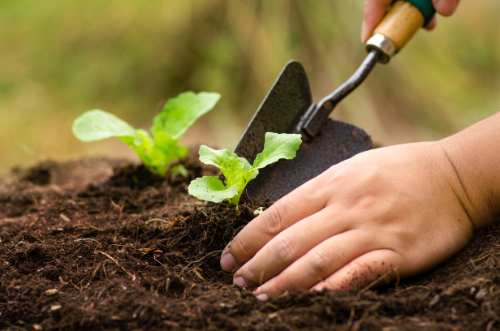
Have you always wanted to start a garden but don’t know the first thing about plants? With spring just around the corner, it’s the perfect time to start thinking about your garden. Don’t be hesitant to start just because you’re new to the garden club. Turns out, a green thumb isn’t required if you use some of these tips and tricks. Grab your shovel and let’s dig in.
Regrow plants from the scraps.
If you want to start small and simple, try this little trick. Certain foods can be regrown from the part of the plant you typically throw away. Instead of tossing out the leafy part of the celery stock or the little root ends of the green onion, submerge the ends in water and it will start to regrow. You’ll have to be sure to give each plant the proper amount of sunlight each day, and depending on what it is you may have to transplant it back outside once it gets large enough. Some of the foods that are able to be regrown from the scraps are green onion, celery, romaine lettuce, potatoes, garlic, and some herbs like basil and cilantro.
Buy already started plants.
If you live in an area where the spring season only has a small window before summer takes over, don’t waste time starting from the seed. Most nurseries have plants that have already been started weeks, if not months in advance. All you have to do is transplant it into your garden and continue to give it the love it needs and it will start yielding the fruits of other people’s labors. Be gentle with the plants root system when transplanting it from the stores pot and into your garden. If you damage the roots, it may have a hard time growing. Also, a little extra fertilizer won’t hurt it when making the transition into its new home.
Don’t dig up last season’s plants.
Before you start excavating the old plants from last years garden, check to see if it’s still alive. Some plants don’t completely die off but just go dormant during the off season. In fact, some plants like strawberries for example, give bigger fruits the more mature the plant is. This means that if you keep the plant in the ground all year long and let it mature, each season you will get bigger, juicer results.
Make your own compost.
Everyone likes a little treat every now and then; so why not treat the plants in your garden too. Composting is a great way to recycle waste. Instead of filling up the landfill, fill up your compost bucket and let your table scraps live on as nutrients for the plants in your garden. The good thing about compost is that it’s more of a set it and forget it asset to your garden. Unlike the plants, you don’t need to babysit it and you can add as little or as much into it as you want.





